- Home
- Tim Winton
The Riders Page 2
The Riders Read online
Page 2
SCULLY HACKED GRIMLY AT THE claggy ground, his spirits sinking with every chill roll of sweat down his back as he inched his way along the last stretch of trench in the mean light of morning. He was beginning to wonder if maybe this job was beyond him. After all, he was no tradesman and he was working in a country where he knew none of the rules. And he was doing it alone. Every time he saw that forlorn heap of clothes and refuse out behind the barn he’d begun to see it as his own. Would it happen? Sometime in the future a lonely pile like that marking his failure? Man, he was low this morning. He wasn’t himself. He watched a blur tracking uphill across the ridge. A hare. Funny how they always ran uphill. It dodged and weaved and disappeared into fallen timber.
Dogs barked in the valley below. He rested again, leaning on the smooth hickory handle of the mattock, and saw a car, a little green Renault van, labouring up the lane. Scully threw down the mattock hopefully and slugged across the mud in his squelching wellies to the front of the house where, thank God, the AN POST van was pulling in cautiously. He wiped his hands on his mired jeans. The driver killed the motor and opened the door.
‘Jaysus,’ said a long, freckled shambles of a man unfolding himself like a piece of worn patio furniture. ‘I thought it was the truth all along.’
Beneath the postman’s crumpled cap was a mob of red hair and two huge ears. Scully stood there anxiously.
‘So there’s someone livin back in Binchy’s Bothy.’
‘That’s right,’ said Scully. ‘My third day.’
‘Peter Keneally. They call me Pete-the-Post.’
Scully reached out and shook his freckled hand. ‘G’day.’
The postie laughed, showing a terrible complement of teeth.
‘Would you be Mister F. M. Scully, now?’
‘That’s me.’
‘You’re the Australians, then.’
‘One of them, yeah.’
‘By God, you’re famous as Seamus around here already. Jimmy Brereton down there by the castle says you saw this place and bought it in less time than it takes to piss.’
Scully laughed. ‘Close enough.’
‘Signed the papers in Davy Finneran’s pub, no less.’
‘Yeah, did it on the spot. And they say the Paddies are stupid.’
The postman roared.
‘My wife had . . . a feeling about the place,’ said Scully, needing to explain himself somehow, knowing that no explanation could sound reasonable enough for what they had done.
‘Well, I suppose that’s nothin to be laughin at, then.’
Scully shrugged. ‘It does seem stupid at certain moments of the day.’
‘Ah, but it’s a fine spot up here, high and away. And you’re very welcome.’
‘Thanks.’
Scully scraped mud from his boots and looked now at the pale envelope in the postman’s hands. The two men stood there poised awkwardly for a moment.
‘Thirsty work, no?’
After a long moment Scully realized the man needed a drink.
‘Don’t spose you fancy a nip?’
‘A nip?’ The Irishman squinted at him.
‘A dram,’ said Scully. ‘I know it’s early.’
‘Ah. Weeeell, it is a bit sharp out still.’
‘I’ve got some Tullamore Dew inside.’
‘That’s a mornin whiskey alright,’ the postie said with a wink.
They went inside by the fire and Scully threw on a rotten fencepost. In the pale light of day the interior was foul and dismal.
‘Excuse the mess.’
‘That Binchy always was a dirty auld bastard, rest his soul. This is the best I’ve seen the place.’
‘I’ll get there.’
‘That you will, Mr Scully.’
‘The name’s Fred. Everyone just calls me Scully, even the missus.’
‘Well, if it’s good enough for her . . .’
‘They still had all his clothes and everything in here.’
‘Ten years, so. It just laid here rottin. Got to be people were nervous of it. Still, the Irish love to frighten emselves half to death.’
‘I would have thought his family might have come and taken his things.’
‘There is no family, poor man. He was gardener to the castle like his father before him. Everyone’s dead.’
‘Including the castle,’ said Scully. ‘When was the last time anyone tended to that garden?’
‘Oh, it was burnt back in the Troubles. No one’s lived in it since. The lords and ladies went their way and the Binchys stayed in the gardener’s bothy. It was left to them. Binchy and his Da grew some spuds and did a bit of poachin. They liked to drink, you might say.’
‘Oh, here.’ Scully dug the bottle out of his cardboard box and poured a little into tin cups.
‘Cheers.’
‘Slainte:’
The whiskey ran hot all through him. He only really liked to drink after dark.
Scully looked anxiously at the pale envelope in the postman’s hand. It was a telegram, he could see it now. He curled his toes inside his boots.
‘Your wife had a feelin, you say?’
Scully squirmed, lusting for the telegram, glad of the company and a little embarrassed about his own presence here. He couldn’t imagine what the Irishman must think of him.
‘Yeah. Yeah, she just went all strange and said this is it, that she felt she’d been here before, like déjà vu. She had this odd feeling that this is where we should live.’
‘She’s Irish, then.’
‘No. There’s no ancestral pull. People talk about things like that but . . . no, nothing.’
‘Well, you are. With a name like Scully.’
‘Well, bog-Irish maybe a long way back. Desert Irish by now.’
‘Ha, desert Irish!’ The postie stomped his feet.
The fire hissed and spat. The walls steamed and the house smelled like a locker room hosed down with fish blood. Scully looked at the black work cracks in the Irishman’s fingers.
‘D’you know where I could hire a cement mixer? I thought there might be a place in town.’
‘Ce-ment mixer? Conor’s your man.’
‘Conor.’
‘My brother from Birr. He’s the electrician, but he does a bit of this and that, you know.’
‘Terrific. Maybe I could get a phone number, or something?’
‘Be damn, I’ll bring it meself tomorrow,’ said Pete-the-Post slamming his cup down on the battered mantelpiece. ‘In that little green machine out there, piled in on the mail of the Republic, no less.’
‘Look, don’t go to any trouble.’
‘No trouble at all.’
Scully watched the postie lick his lips, as though tasting the last of the whiskey on them, with eyes shut to the wan light bending in through the window, and he wondered if he’d ever get his telegram.
‘Rightso, time to go.’ The postman whanged himself on the cheek with the heel of his palm. ‘Ah, nearly forgot – something from the Dublin Telegraphs.’
He handed over the envelope and Scully did his best not to snatch at it in his excitement.
‘Good news, I hope. Never liked telegrams, meself.’
‘Thanks,’ said Scully, stuffing it in his pocket and following Pete-the-Post to the door.
‘See you in the mornin!’
As the van pulled away, motor racing horribly, Scully tore the envelope open and the telegram in half so he had to stoop to the mud and fit the pieces together.
HOUSE ON THE MARKET. AGENT ASSURES QUICK SALE. PACKING NOW. BILLIE AT YOUR MUM’S. WILL BE BACK BEFORE CHRISTMAS. USE TELEGRAMS TILL PHONE ON THERE. JENNIFER.
A light drizzle began to drift in. Rooks and jackdaws came and went from the castle keep down in the misting hollow. Scully shifted from foot to foot, inexplicably deflated.
It was good news. It was contact, confirmation. But so damn businesslike. What was the result of the ultrasound? How was everybody? What did the wide brown land look like? Was it summer, real acetylene
summer? And did she miss him half as much as he missed her? Though it was a telegram. You couldn’t exactly get hot and sweaty in a telegram.
He stuffed the paper into his pocket. It was actually happening. They could stop moving at last and make a home somewhere, the three of them. Maybe she’s right about magic in the spur of the moment. Could be she’s been cautious and sensible too long. It was her new thing, cutting loose.
It was her prevailing outlook ever since they came abroad, but he had to admit he liked her just as well the old way. She was like a sheet anchor sometimes, a steadying influence on him, on everyone around her. Made people laugh, that sensible streak in her, but it also made her someone of substance. Jennifer wasn’t just a good-looking woman, he once told her wincing parents, she was someone to be reckoned with. God, he missed her, missed them both. Their brown, swimming bodies and birdcall voices – even the sound of their sober, womanly peeing from behind a closed door. He missed dumb jokes with Billie and the warped games of Monopoly that she strung out endlessly with her insistence on ‘the true and right and proper rules’. Seven and a half. She was a bright kid, and all fatherly pride aside, he knew she was different from other kids. She felt things strongly. She was fierce, precocious and loyal. She took shit from no one and saw things so clearly at times that it took your breath away. Now that he thought of it, he’d spent more time with her than he had with Jennifer. He missed their companionable silences. They understood each other, him and Billie. He wondered sometimes if Jennifer saw it, the way the two of them moved together in a crowd, in a boat, at the breakfast table. It was almost as though they each recognized themselves in the other. It was weird, like a gift. Jennifer was always busy, but she must have seen it.
Late in the afternoon, heaving and gasping, with the walls finally clear of soil and stones, he sat down for air on a stump behind the barn and saw Binchy’s things piled out there, reeking of turps. He rattled the matches in his pocket but left them where they were. Why spoil the moment of triumph? He tilted his head back and let the sweat run through his matted hair. Tonight he’d boil up some water and take a real scrubdown. He’d rig up a bed from an old door and some bricks. The flags were too cold to sleep on another night. ‘Live like an animal,’ his father used to say, ‘and you’ll start thinkin like one!’ Scully laughed at himself. This was like the tree houses of his boyhood, the Robinson Crusoe factor, the steady search for creature comforts. A cup of tea would render him human – he knew it.
After dark, scrubbed and fed and hugely satisfied, Scully went walking, a mere shadow moving through the ash wood with the wind tearing at the bare crowns of the trees above him. He was sore and happy, his hands still stung with nettles and his boots were full of stones. He saw the lights of farmhouses down in the valley, and wondered what they did at night, these farming families. He hadn’t introduced himself yet. This was the furthest he’d been from the house since he arrived. But there’d be time. The night hardened with cold. The black mass of the castle loomed below. Scully sucked in the metallic air and watched the trees in turmoil, listened to their mob violence raging above him against the sky. When he turned and looked back uphill he saw the three candles burning in the curtainless window. The wind bullied at him, ripping through the cold wet of his hair, but he stood there a long time in the wood below his field, just watching those three candles twinkling in the empty house.
• • •
IN HIS DREAMS THAT NIGHT Scully ran through long grass between walls and hedges uphill with lights gathering behind him and only the cover of grass and night before him. On he ran, never stopping to see what it was behind him, blindly going on into darkness.
Four
SCULLY JERKED AWAKE. A motor idled outside. It was light already. He wriggled from his stained sleeping bag and went to the window but could see only his ragged reflection in the frost. He opened the top half of his front door, felt the fierce cold, and saw a filthy grey truck slipping and yawing down the icy hill with its tailgate flapping. Diesel smoke hung in the air. He went out barefoot across the frozen ground and saw two tons of builders’ sand heaped against the barn wall.
From around the bend on the hill came the little green van.
‘Boots are the go, Mr Scully,’ said Pete-the-Post getting out to unlock the back doors. ‘On a mornin such as this, it’s definitely boots, don’t you think?’
Scully grinned, curling his toes on the unyielding mud. He helped the postman unload the cement mixer and several bags of cement.
‘Cheaper than airmail, it is.’
‘I really appreciate this,’ said Scully.
‘There’ll be a load of blocks here within the hour, and meself 11 be by at one o’clock to start into it.’
Scully blinked.
‘Well, you’ll be needin a hod-carrier, I expect.’
‘Well. I. Haven’t you got the post to do?’
‘Diversify, Mr Scully, that’s my motto. We’re in the EC now, you know.’
‘The EC.’
‘This is the new Ireland you’re lookin at.’
‘Really?’
‘No, it’s the same auld shite, believe me,’ the postman said, laughing, ‘but don’t go tellin!’
• • •
THAT MORNING SCULLY CLEANED THE cottage out properly. He shovelled and scraped and swept until its four simple rooms were clean enough to move through without grimacing, and then he rearranged his equipment into an orderly system. He crawled across the upstairs floors on all fours, marking boards that needed replacing, and he went grimly through the barn, finding ancient bags of coal, cooking implements, some quite decent wood, and another wide door he sat on blocks to improve his temporary bed. Out behind the barn he looked again at Binchy’s things and took from the heap a small, black rosary which he set above the mantel on a nail in the wall. Beside it he stood a stiff black-and-white print of the three of them, Jennifer, Billie and him, that a friend had taken one freezing day in Brittany. He stared at it a good while, remembering the day. Their Parisian friend Dominique had the Leica going all weekend. She took so many photos they got blasé and began to pose. This one was in the cemetery at St Malo. All of them were laughing. Jennifer’s black hair falling from beneath a beret. His and Billie’s like matching treetops, just mad foliage from the same forest. It was a good photo. They hung together as a shape, the three of them. Just behind them was the circled cross of the Celts, its carved stone knotted with detail, the entwined faces of saints and sinners. It was beautiful, so handsome it made the three of them look dignified. Dominique knew her business. She could take a photo. They’d miss her. Half of what you did in travelling was simply missing things, sensations, people. He’d missed so long and hard these last couple of years he could barely think of it. And he still had some longing ahead of him, the worst kind, until Christmas.
He touched the photograph once. Coal burned lustily in the grate. The house began to steam and dry. Scully went out to survey the gable wall.
Five
THE DOOR SLIDES TO ON the lowing, dungspraying cows as the man in the cloth cap turns to see the scaffold up against Binchy’s Bothy and two figures beneath it like trolls atop the hill. The sky is the colour of fish, a Friday colour beGod, and the bare trees stand forlorn. It’s Pete-the-Post up there with that woolly young bastard with love in his eyes.
He fingers in his waistcoat for the damp fag he’s been saving. The stink of silage burns at the back of his gullet and he lights up to beat it off.
It’s love alright. Jimmy Brereton, bachelor unto the grave, recognizes a man doomed by love, snared by a woman. You could see it the day they turned up in that thresher of a Volkswagen. Her with the hair out like a black flag and her hands on the smooth stones of Binchy’s wall as if it had a fever pulse, and him, hairy as anything on Christ’s earth, waiting on her with eyes big and hopeless as a steer. The shackles of marriage, of doilies and lace curtains and mysterious female illnesses staring him in the face, and him cheerful as you like, and sheepish, s
heepish like a lamb unto the slaughter, poor booger.
Jimmy Brereton kicks the shite from his boots and watches a while. He wishes they’d come down and bulldoze that eyesore nuisance of a damn castle out of his high field while the government’s asleep in Dublin. It’s a danger to one and all. In a big norther stones and rubble come belting down out of the keep, and a man can no longer leave his cattle in there out of the weather for fear of having them brained with Celtic history. He thanks God and Arthur Guinness he sleeps well enough at night not to worry himself sick about the things he’s seen here over the years. Things that make the hairs on your arms stand up, like every poor bastard mortared into the walls and fed to the pigs and tilled into the cellars of that place is stirring. Sometimes you hear voices on the wind and stones falling like men to the ground. Bawlers, stinks, a bedlam of rooks, and lights from the mountains, streams of them that he doesn’t look for anymore. It’s not madness or drink in all of this, though he bothers the bottle mightily. All the valley people are chary of the place. He remembers standing right here with his own Da watching the priest from Limerick bellowing Latin at the keep and waving his candles at no one in particular. No Brereton, man or child, would be up there after dark at that nasty fooker of a place. It’s a blight on his land, and it’s made him an early retirer, a six-pint man at sunset. But he’s not unhappy. Things might have turned out worse. He might have married Mary Finneran in 1969 instead of backing out like a man with spine. He might have a brother like Peter Keneally’s instead of no family to speak of. He might be up the hill there with those two mad boogers trying to save the long lost and working like black monkeys.
Sheepish, that’s him. That woolly booger with the hod on his shoulder and the love in his eyes.
Jimmy Brereton retires indoors to the company of Mr Guinness.
Six
JUST ON DARK, Scully and Peter Keneally laid the last block of their rough buttress and stood blowing steam on the makeshift scaffold.
‘That’s got her,’ said the postman. ‘Tomorrow we’ll render it!’

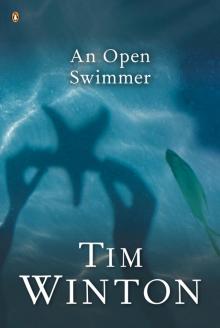 An Open Swimmer
An Open Swimmer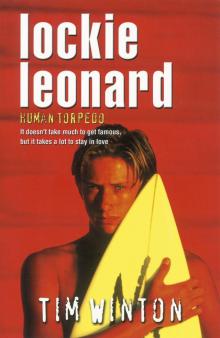 Human Torpedo
Human Torpedo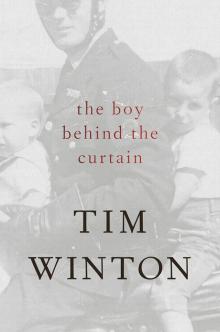 The Boy Behind the Curtain
The Boy Behind the Curtain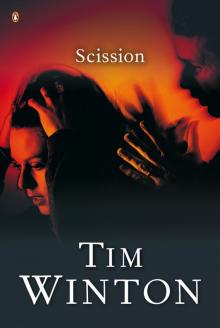 Scission
Scission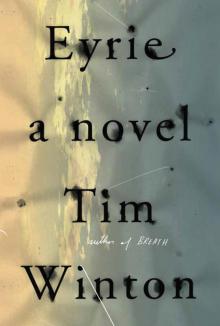 Eyrie
Eyrie Island Home
Island Home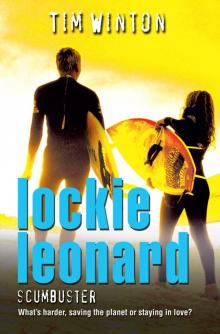 Scumbuster
Scumbuster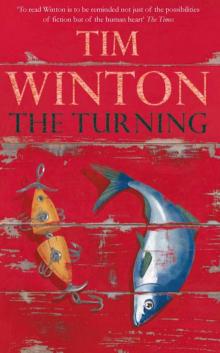 The Turning
The Turning Legend
Legend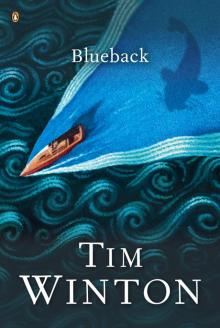 Blueback
Blueback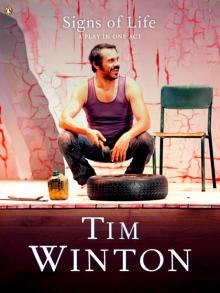 Signs of Life
Signs of Life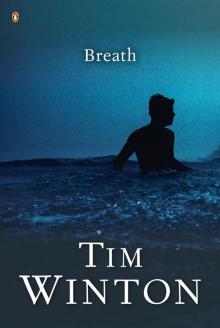 Breath
Breath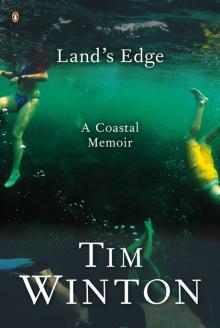 Land's Edge
Land's Edge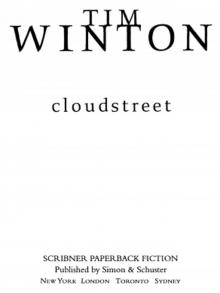 Cloudstreet
Cloudstreet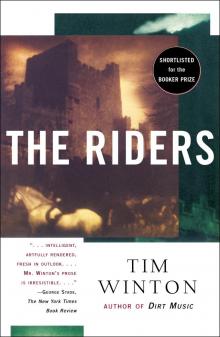 The Riders
The Riders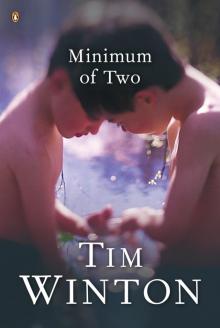 Minimum of Two
Minimum of Two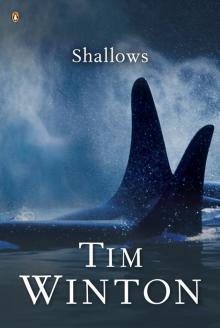 Shallows
Shallows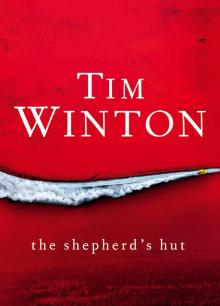 The Shepherd's Hut
The Shepherd's Hut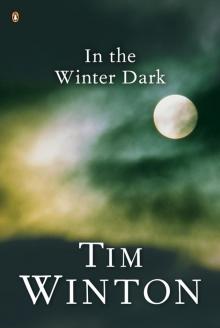 In the Winter Dark
In the Winter Dark